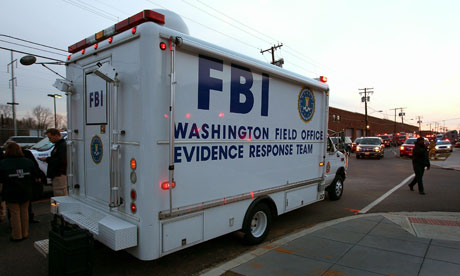
The section 215 provision of the newly-extended Patriot Act gives the government extensive powers, which Democratic senators suggest is being used far beyond any legitimate anti-terror purpose.
Dan Kennedy
Boston, Mass.
It was a notorious provision of the USA Patriot Act, renewed on Thursday, that allowed the government to snoop on what library books you'd borrowed, what videos you'd rented, your medical records – anything, really, if investigators thought it might have something to do with terrorism, no matter how tangential.
I wrote about it for the Boston Phoenix in 2003, as an example of the then budding excesses of the Bush-Cheney years.
Well, section 215 is back – not that it ever went away. Charlie Savage reports in Friday's New York Times that two Democratic senators, Ron Wyden of Oregon and Mark Udall of Colorado, have accused the Obama administration of using Section 215 for purposes not intended by Congress. Russ Feingold, then a Democratic senator for Wisconsin, raised similar alarms in 2009.
The senators know what the White House is up to because they were privy to secret testimony. But under Senate rules, they can't reveal what they learned. Thus they have demanded that the White House come clean with the public. "Americans would be alarmed if they knew how this law is being carried out," Udall is quoted as saying.
Julian Sanchez of the Cato Institute recently described section 215 in an interview with Salon, so:
"It allows investigators to get an order from the FISA court permitting them to compel the production of any tangible thing that is relevant to an investigation. It's pretty unlimited in scope. Any record or other thing that pertains to a suspected agent of a foreign power or someone in contact with them is under the law considered to be 'presumptively relevant'. That means the judge has no discretion to deny such requests. The records don't have to belong to anyone who is thought to be guilty of anything."FISA, you may recall, is the Foreign Intelligence Surveillance Act. At the height of the Bush years, the White House didn't even bother with the niceties of going to a FISA court before ordering wiretaps. But as Sanchez notes, the FISA provision isn't much more than a figleaf, anyway.
Which reminds me: the Obama justice department recently issued a subpoena ordering James Risen, one of the New York Times reporters who broke the story about the Bush administration's secret wiretaps, to reveal his confidential sources.
President Obama's approach to civil liberties has been similar to that of his predecessors: for them, when convenient; against them, when upholding our rights would interfere with his exercise of untrammelled executive power. Last year, ACLU executive director Anthony Romero pronounced himself "disgusted" with Obama's civil rights record.
George W Bush and Dick Cheney remain outliers because of their embrace of torture, secret rendition and the like. Otherwise, though, Obama fits into a long pattern of presidents whose actions on civil liberties are very different from their pious words.
No comments:
Post a Comment